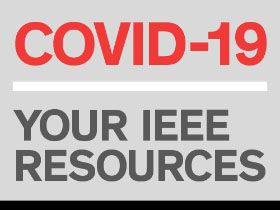NOVID Tracing App Scans Your Social Circle for COVID-19 Risk
 Photo: Carnegie Mellon University
Photo: Carnegie Mellon University 
THE INSTITUTE Forewarned is forearmed, the saying goes. The same could apply to the coronavirus. Knowing that someone connected to you has been exposed to the virus or tested positive can help you determine your risk of infection.
The new NOVID app can notify you when people in your extended interaction network self-report symptoms or test positive, so you can take preventative measures. The app was developed by IEEE Member Po-Shen Loh, a mathematics professor at Carnegie Mellon.
Most contact-tracing apps alert you if you've crossed paths with someone who tests positive. NOVID tries to protect its users by helping them spot cases connected to their extended network, ideally before the virus reaches them.
We came up with something very different from what everyone else was doing," Loh says. We've invented a type of radar that tells you about the danger coming from your interaction network."
Early WarningWhen someone in the user's network reports an exposure or a positive test result in the app, NOVID alerts others in the social circle, telling them how close they are in terms of a physical relationship to the infected person. A 3," for example, means you spent time with someone who spent time with someone else who was with a third person who recently reported he or she was sick.
The app does not collect personal information. It visually displays the spread of the virus through the network. A different color is assigned to symptomatic users, exposed users, and positive users.
Like a weather satellite that provides early warning of incoming hurricanes, the app empowers individuals to see the transmission [of the virus] approach and incites behavioral change to directly avoid exposure," Loh writes in a preprint of his paper Flipping the Perspective in Contact Tracing."
NOVID automatically communicates with nearby smartphones that are also running the app, Loh says. Both people using the app have to come into close proximity to one another to be directly connected, he says, but they don't need to do anything within the app, because the connection is automatic.
The app's value is that you know that danger is close, so that you can generally raise your guard by making sure to properly wear a better mask [not just cloth], and be careful about eating lunch maskless in the office break room," Loh says.
The power of this new tool is that it gives an endgame to the pandemic," he says. People don't want to wear masks forever, and this provides a way to transition to a maskless situation, where people can still know when to bring their masks back in the event of a new variant."
Loh and his team used ultrasound, Bluetooth, and Wi-Fi to develop the app, and to automatically determine the connections in the interaction network.
To address personal privacy concerns, Loh says, the app doesn't collect users' names, email addresses, phone numbers, or GPS coordinates. Instead, he says, a random ID is created for each mobile device.
The app is intended for communities of people-such as classmates, coworkers, or neighbors-where cases of COVID-19 are required to be reported to public health officials, he says.
In the United States, NOVID is being used at Carnegie Mellon and Georgia Tech. The two universities have health departments that track COVID-19 test results, and they provide codes to those who test positive-which they can voluntarily enter into the app. Students' identities are kept anonymous to preserve privacy.
FULFILLING A MORAL COMMITMENTLoh was looking for a way to help fight COVID-19 after he was asked to meet a commitment he made as a Hertz Fellowship recipient. Sponsored by the Hertz Foundation, the fellowship lets recipients pursue research of their choosing at a participating university. In return, Hertz Fellows promise to make their skills available to the United States in times of a national emergency, according to the program's website. Loh received a call to action from the foundation in March 2020.
The notice reminded him of his commitment, and he said the pandemic was a good time to honor it, because the coronavirus was not only a national emergency but also an international emergency."
I didn't know what to do," he says, because I'm a math guy."
It didn't take him long to figure out how he could contribute, however. The day after the call, he says, an idea came to him about how to use his network theory and graph theory research.
For the first time, we can use these theories to fight disease," he says. I dropped everything to do this app."
The development of NOVID was initially funded by Loh's social enterprise, Expii, with substantial subsequent assistance from philanthropists. Expii offers online math and science educational programs.
IEEE membership offers a wide range of benefits and opportunities for those who share a common interest in technology. If you are not already a member, consider joining IEEE and becoming part of a worldwide network of more than 400,000 students and professionals.
< Back to IEEE COVID-19 Resources